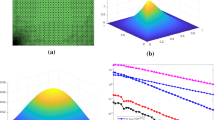Abstract
The main idea of our Goal-Oriented Adaptive (GOA) strategy is based on performing global and uniform h- or p-refinements (for h- and p-adaptivity, respectively) followed by a coarsening step, where some basis functions are removed according to their estimated importance. Many Goal-Oriented Adaptive strategies represent the error in a Quantity of Interest (QoI) in terms of the bilinear form and the solution of the direct and adjoint problems. However, this is unfeasible when solving indefinite or non-symmetric problems since symmetric and positive definite forms are needed to define the inner product that guides the refinements. In this work, we provide a Goal-Oriented Adaptive (h- or p-) strategy whose error in the QoI is represented in another bilinear symmetric positive definite form than the one given by the adjoint problem. For that purpose, our Finite Element implementation employs a multi-level hierarchical data structure that imposes Dirichlet homogeneous nodes to avoid the so-called hanging nodes. We illustrate the convergence of the proposed approach for 1D Helmholtz and convection-dominated problems.
Access this chapter
Tax calculation will be finalised at checkout
Purchases are for personal use only
Similar content being viewed by others
References
Alvarez-Aramberri, J., Pardo, D., Barucq, H.: A secondary field based hp-finite element method for the simulation of magnetotelluric measurements. J. Comput. Sci. 11, 137–144 (2015)
Becker, R., Rannacher, R.: An optimal control approach to a posteriori error estimation in finite element methods. Acta numerica 10, 1–102 (2001)
Darrigrand, V., Pardo, D., Chaumont-Frelet, T., Gómez-Revuelto, I., Garcia-Castillo, L.E.: A painless automatic hp-adaptive strategy for elliptic problems. Finite Elem. Anal. Des. 178, 103424 (2020). https://doi.org/10.1016/j.finel.2020.103424
Darrigrand, V., Pardo, D., Muga, I.: Goal-oriented adaptivity using unconventional error representations for the 1D Helmholtz equation. Comput. Math. Appl. 69(9), 964–979 (2015). https://doi.org/10.1016/j.camwa.2015.03.006, http://www.sciencedirect.com/science/article/pii/S0898122115001017
Darrigrand, V., Rodríguez-Rozas, Á., Muga, I., Pardo, D., Romkes, A., Prudhomme, S.: Goal-oriented adaptivity using unconventional error representations for the multi-dimensional Helmholtz equation. Int. J. Numerical Methods Eng. 113(1), 22–42 (2018). https://doi.org/10.1002/nme.5601, http://dx.doi.org/10.1002/nme.5601, nme.5601
Demkowicz, L., Rachowicz, W., Devloo, P.: A fully automatic \(hp\)-adaptivity. In: Proceedings of the Fifth International Conference on Spectral and High Order Methods (ICOSAHOM-01) (Uppsala), vol. 17, pp. 117–142 (2002). https://doi.org/10.1023/A:1015192312705,http://dx.doi.org/10.1023/A:1015192312705
Demkowicz, L.: Computing with \(hp\)-adaptive finite elements. One and two dimensional elliptic and Maxwell problems. Applied Mathematics and Nonlinear Science Series, vol. 1. Chapman & Hall/CRC, Boca Raton (2007). https://doi.org/10.1201/9781420011692, http://dx.doi.org/10.1201/9781420011692
Demkowicz, L., Kurtz, J., Pardo, D., Paszyński, M., Rachowicz, W., Zdunek, A.: Computing with \(hp\)-adaptive finite elements. Frontiers: Three Dimensional Elliptic and Maxwell Problems with Applications. Applied Mathematics and Nonlinear Science Series, vol. 2. Chapman & Hall/CRC, Boca Raton (2008)
Demkowicz, L., Oden, J.T., Rachowicz, W., Hardy, O.: Toward a universal hp adaptive finite element strategy, part 1. Constrained approximation and data structure. Comput. Methods Appl. Mech. Eng. 77(1–2), 79–112 (1989)
Hintermüller, M., Hinze, M., Kahle, C., Keil, T.: A goal-oriented dual-weighted adaptive finite element approach for the optimal control of a nonsmooth Cahn-Hilliard-Navier-stokes system. Optim. Eng. 19(3), 629–662 (2018)
Jhurani, C., Demkowicz, L.: Multiscale modeling using goal-oriented adaptivity and numerical homogenization. Part I: mathematical formulation and numerical results. Comput. Methods Appl. Mech. Eng. 213, 399–417 (2012)
Key, K.: Mare2dem: a 2-D inversion code for controlled-source electromagnetic and magnetotelluric data. Geophys. J. Int. 207(1), 571–588 (2016)
Muñoz-Matute, J., Alberdi, E., Pardo, D., Calo, V.M.: Time-domain goal-oriented adaptivity using pseudo-dual error representations. Comput. Methods Appl. Mech. Eng. 325, 395–415 (2017)
Oden, J.T., Prudhomme, S.: Goal-oriented error estimation and adaptivity for the finite element method. Comput. Math. Appl. 41(5-6), 735–756 (2001). https://doi.org/10.1016/S0898-1221(00)00317-5, http://dx.doi.org/10.1016/S0898-1221(00)00317-5
Ovall, J.S.: Asymptotically exact functional error estimators based on superconvergent gradient recovery. Numerische Mathematik 102(3), 543–558 (2006)
Pardo, D., Demkowicz, L., Torres-Verdín, C., Paszynski, M.: Two-dimensional high-accuracy simulation of resistivity logging-while-drilling (LWD) measurements using a self-adaptive goal-oriented \(hp\) finite element method. SIAM J. Appl. Math. 66(6), 2085–2106 (2006). https://doi.org/10.1137/050631732, http://dx.doi.org/10.1137/050631732
Prudhomme, S., Oden, J.T.: On goal-oriented error estimation for elliptic problems: application to the control of pointwise errors. Comput. Methods Appl. Mech. Eng. 176(1–4), 313–331 (1999). https://doi.org/10.1016/S0045-7825(98)00343-0, http://dx.doi.org/10.1016/S0045-7825(98)00343-0
Romkes, A., Oden, J.T.: Adaptive modeling of wave propagation in heterogeneous elastic solids. Comput. Methods Appl. Mech. Eng. 193(6–8), 539–559 (2004)
Van Der Zee, K.G., Tinsley Oden, J., Prudhomme, S., Hawkins-Daarud, A.: Goal-oriented error estimation for Cahn-Hilliard models of binary phase transition. Numer. Methods Partial Differ. Eqn. 27(1), 160–196 (2011)
Zander, N., Bog, T., Elhaddad, M., Frischmann, F., Kollmannsberger, S., Rank, E.: The multi-level \(hp\)-method for three-dimensional problems: dynamically changing high-order mesh refinement with arbitrary hanging nodes. Comput. Methods Appl. Mech. Eng. 310, 252–277 (2016). https://doi.org/10.1016/j.cma.2016.07.007, http://www.sciencedirect.com/science/article/pii/S0045782516307289
Zander, N., Bog, T., Kollmannsberger, S., Schillinger, D., Rank, E.: Multi-level \(hp\)-adaptivity: high-order mesh adaptivity without the difficulties of constraining hanging nodes. Comput. Mech. 55(3), 499–517 (2015). https://doi.org/10.1007/s00466-014-1118-x
Zander, N.D.: Multi-level \(hp\)-FEM: dynamically changing high-order mesh refinement with arbitrary hanging nodes. Ph.D. thesis, Technische Universität München (2017)
Author information
Authors and Affiliations
Corresponding author
Editor information
Editors and Affiliations
Rights and permissions
Copyright information
© 2022 The Author(s), under exclusive license to Springer Nature Switzerland AG
About this paper
Cite this paper
Caro, F.V., Darrigrand, V., Alvarez-Aramberri, J., Celaya, E.A., Pardo, D. (2022). 1D Painless Multi-level Automatic Goal-Oriented h and p Adaptive Strategies Using a Pseudo-Dual Operator. In: Groen, D., de Mulatier, C., Paszynski, M., Krzhizhanovskaya, V.V., Dongarra, J.J., Sloot, P.M.A. (eds) Computational Science – ICCS 2022. ICCS 2022. Lecture Notes in Computer Science, vol 13351. Springer, Cham. https://doi.org/10.1007/978-3-031-08754-7_43
Download citation
DOI: https://doi.org/10.1007/978-3-031-08754-7_43
Published:
Publisher Name: Springer, Cham
Print ISBN: 978-3-031-08753-0
Online ISBN: 978-3-031-08754-7
eBook Packages: Computer ScienceComputer Science (R0)




